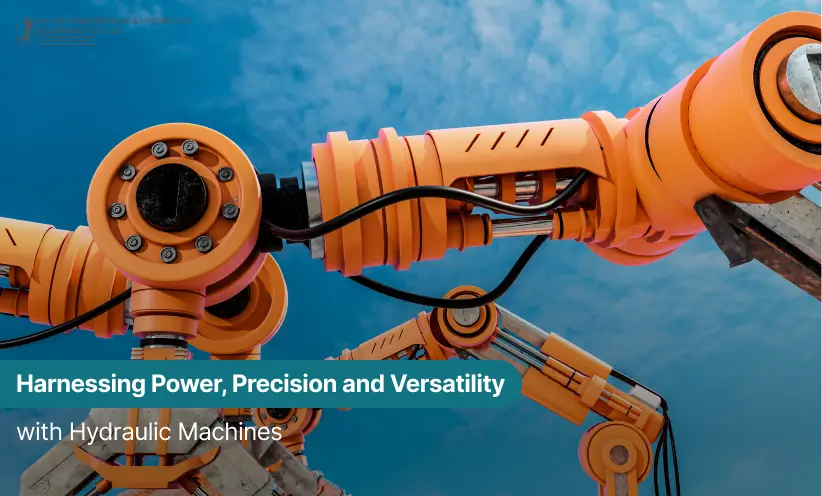Hydraulic machines have revolutionized various industries, offering unmatched power, precision, and versatility. With their ability to generate immense force while maintaining accurate control, hydraulic systems have become indispensable in numerous applications. In this article, we will delve into the basics of hydraulic machines, explore their power and precision, examine their versatility, and discuss future trends in hydraulic technology.
Understanding the Basics of Hydraulic Machines
Before we dive into the intricacies of hydraulic power, let’s establish a fundamental understanding of how hydraulic systems work. At the core of these machines lies the principle of hydraulics, which involves the transmission of force through an incompressible fluid, typically oil or water.
Hydraulic systems consist of key components, including a pump, valves, actuators, and fluid reservoirs. The pump circulates the fluid, exerting pressure that drives the machine’s movement. Valves, on the other hand, control the flow and direction of the fluid, allowing for precise control over the machine’s operations.
The Fundamental Principles of Hydraulics
Hydraulic machines operate based on Pascal’s law, which states that when a pressure is applied to a fluid in a confined space, it is transmitted equally in all directions. This principle enables hydraulic systems to multiply force, making them capable of producing significant power output.
Key Components of Hydraulic Systems
In order to fully comprehend the capabilities of hydraulic machines, it’s essential to familiarize ourselves with their key components. The pump plays a crucial role by converting mechanical energy into hydraulic energy, providing the necessary force to drive the system.
Valves are integral to controlling the flow and regulating the pressure of the fluid. Actuators, such as hydraulic cylinders or motors, convert hydraulic energy into mechanical energy, enabling the machine to perform specific tasks. The fluid reservoir stores the hydraulic fluid, ensuring a constant supply for the system.
Now, let’s take a closer look at the pump. There are different types of pumps used in hydraulic systems, including gear pumps, vane pumps, and piston pumps. Gear pumps are known for their simplicity and reliability, making them suitable for a wide range of applications. Vane pumps, on the other hand, offer higher efficiency and smoother operation. Piston pumps, with their ability to handle high pressures, are often used in heavy-duty hydraulic systems.
When it comes to valves, there are various types that serve different purposes. Directional control valves determine the flow direction of the fluid, allowing the machine to move in different directions. Pressure control valves regulate the pressure within the system, preventing damage from excessive pressure. Flow control valves, as the name suggests, control the flow rate of the fluid, enabling precise control over the machine’s speed.
Actuators, such as hydraulic cylinders or motors, are responsible for converting the hydraulic energy into mechanical energy. Hydraulic cylinders are commonly used in applications that require linear motion, such as lifting heavy objects or pushing/pulling mechanisms. Hydraulic motors, on the other hand, are used when rotational motion is needed, such as in machinery or vehicles.
Lastly, the fluid reservoir plays a crucial role in maintaining the hydraulic system’s performance. It stores the hydraulic fluid, ensuring a constant supply for the system. The fluid reservoir also helps dissipate heat generated during operation, preventing the system from overheating. It is important to regularly check the fluid level and quality to ensure optimal performance and longevity of the hydraulic system.
The Power of Hydraulic Machines
One of the most remarkable features of hydraulic machines is their ability to deliver immense power. Through hydraulic systems, even smaller machines can generate forces that surpass those achieved by their direct mechanical counterparts.
How Hydraulics Enhance Machine Power
Hydraulic systems offer mechanical advantage by multiplying force. Since pressure transmitted in a confined fluid remains consistent, a small input force can generate a larger output force. This force amplification enables hydraulic machines to exert tremendous power, making them ideal for heavy-duty applications.
Imagine a hydraulic press being used in a manufacturing plant. With just a gentle push on the control lever, the hydraulic system comes alive, transferring the force to a small piston. This seemingly insignificant movement is transformed into a powerful force that can crush solid metal, shaping it into intricate components with precision and accuracy.
Moreover, hydraulic systems can achieve high torque output, allowing for efficient operation even at low speeds. This feature significantly enhances the power capabilities of hydraulic machines, making them suitable for various tasks that require both force and precision.
Comparing Hydraulic Power to Other Systems
When it comes to power output, hydraulic systems surpass many other alternatives. Unlike electric motors, which often struggle to deliver sufficient torque, hydraulic systems excel in generating high forces even at low speeds. Additionally, hydraulic machines offer superior power-to-weight ratios compared to pneumatic systems, making them versatile across different industries.
Picture a construction site where a hydraulic excavator is hard at work. With its hydraulic-powered arm and bucket, it effortlessly lifts massive amounts of soil and debris. The hydraulic system allows for precise control of the arm’s movement, ensuring that the excavator can delicately maneuver in tight spaces while still exerting the necessary force to complete the task at hand.
Furthermore, hydraulic systems provide consistent power throughout the operation, unlike mechanical systems that may experience power fluctuations. This stability ensures reliable performance, particularly in demanding applications. Whether it’s a hydraulic crane lifting heavy loads or a hydraulic press bending steel, the power output remains constant, guaranteeing efficiency and accuracy.
Precision in Hydraulic Machines
While hydraulic machines boast impressive power, they also excel in precision. Precise control over speed, position, and force in hydraulic systems allows for accurate and repeatable operations, making them invaluable in industries that require meticulous precision.
Achieving Accuracy with Hydraulics
Hydraulic systems’ ability to deliver controlled movements enables precise positioning and fine adjustments. By finely regulating the flow and pressure of the hydraulic fluid, operators can achieve accurate control over the machine’s operations. This precision is particularly critical in tasks such as material handling, where exact positioning is crucial.
Furthermore, the adjustability of hydraulic systems allows for precise speed control. This feature is advantageous in applications that require slow and controlled movements, ensuring that delicate or intricate operations are executed with utmost accuracy.
The Role of Precision in Hydraulic Operations
Precision is essential in various industries, including aerospace, automotive, and manufacturing. Hydraulic machines excel in these sectors, providing reliable and accurate performance in critical processes such as assembly line operations, robotic movements, and high-precision machining.
Moreover, in applications where safety is paramount, hydraulic systems offer fail-safe mechanisms, ensuring precise control and preventing potential accidents. The ability to finely adjust hydraulic machines’ settings allows operators to react quickly to changing conditions, guaranteeing optimal performance while maintaining operational integrity.
Versatility of Hydraulic Machines
In addition to their power and precision, hydraulic machines excel in versatility, catering to a wide range of applications across diverse industries. From construction and agriculture to mining and aviation, hydraulic systems have revolutionized the way tasks are performed.
Wide Range of Applications for Hydraulics
Hydraulic machines find applications in various fields, including heavy machinery, agricultural equipment, and industrial automation. In the construction industry, hydraulic systems power bulldozers, cranes, and excavators, providing the force and control necessary for these demanding tasks.
In agriculture, hydraulic machines enable precise operation in planting and harvesting equipment. Hydraulic systems also play a crucial role in industrial automation, offering smooth and controlled movements in assembly lines and robotic operations.
Adapting Hydraulic Systems for Various Needs
One of the significant advantages of hydraulic machines is their adaptability. Hydraulic systems can be tailored to meet specific requirements by adjusting factors such as fluid flow, pressure, and actuator size. This flexibility allows for customization, ensuring that hydraulic machines are suitable for a wide array of applications.
Furthermore, advancements in hydraulic technology have led to the development of compact and efficient components, making hydraulic systems more adaptable than ever before. These innovations have expanded the horizons for hydraulic machines, enabling their integration into smaller and more specialized applications.
Future Trends in Hydraulic Technology
The world of hydraulic technology is continuously evolving, with ongoing research and development efforts driving innovation in the field. As industries demand higher efficiency, sustainability, and improved performance, hydraulic systems are poised to embrace an exciting future.
Innovations in Hydraulic Systems
One of the key trends in hydraulic technology is the integration of electronic control systems. By incorporating sensors, feedback mechanisms, and intelligent control algorithms, hydraulic machines can optimize their performance, minimize energy consumption, and enhance overall efficiency.
Additionally, advancements in hydraulic fluids, such as bio-based fluids and synthetic oils, contribute to environmental sustainability. These eco-friendly alternatives reduce environmental impact without compromising performance, ensuring a greener future for hydraulic machines.
The Impact of Technology on Hydraulic Efficiency
The development of smart technologies, including the Internet of Things (IoT) and predictive analytics, presents opportunities to enhance the efficiency and reliability of hydraulic systems. Real-time monitoring and proactive maintenance based on data-driven insights can significantly improve machine uptime, reduce downtime, and further optimize hydraulic performance.
Furthermore, digital connectivity allows for remote monitoring and control, enabling operators to supervise and adjust hydraulic machines from anywhere in the world. This feature enhances productivity and convenience while streamlining maintenance processes.
Conclusion
In conclusion, hydraulic machines offer an exceptional combination of power, precision, and versatility. Their ability to harness immense force, coupled with precise control, makes them indispensable in various industries. With ongoing advancements and a promising future of technological innovations, hydraulic systems are well-positioned to continue delivering superior performance while addressing the evolving needs of industries worldwide.


